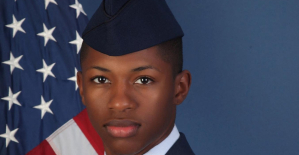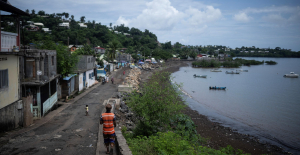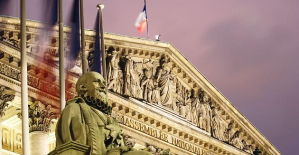Emmanuel Macron will arrive after the others. The President of the Republic is expected in Israel on Tuesday, more than two weeks after the barbaric attack committed by Hamas in Israel on October 7. The head of state was preceded on the spot by the American Joe Biden, the German Olaf Scholz, the British Rishi Sunak, the Italian Giorgia Meloni, the President of the European Commission Ursula von der Leyen… Emmanuel Macron wants to be “useful”, they say at the Élysée to justify having procrastinated. The president also devoted himself “a lot” to preserving “national unity” after the terrorist attack in Arras last Friday. “It is now fully available,” we explain, promising that the president will formulate operational proposals. But the president runs the risk of disappointing on all sides.
Before discussing a way out of the crisis, the Head of State will have to recall the fundamentals of the French position. The president's visit will first demonstrate "France's full solidarity with Israel", we explain at the Élysée. The message is “unambiguous: there are no reservations or yes buts”, we insist, recalling the unprecedented nature of the attacks. “Israel has the right to defend itself,” we emphasize, demanding respect for humanitarian law as part of the response. The condemnation of the Hamas attacks is also unambiguous even if France wants to “avoid a dangerous escalation in the region”. But Emmanuel Macron would also like to “open a political perspective” by recalling France’s position in favor of a two-state solution, Israeli and Palestinian. For French diplomacy, the new Gaza war reminds international actors that the Israeli-Palestinian question cannot be resolved. It “cannot be managed at a minimum”, we explain.
Emmanuel Macron will bring these messages to Prime Minister Benjamin Netanyahu as well as President Isaac Herzog, but also to General Benny Gantz and opposition leader Yair Lapid. He also plans to meet with his Arab partners, the president of the Palestinian authority, the king of Jordan, the Egyptian president and Gulf officials. The Élysée did not specify whether it would be possible for him to go to an Arab capital. The head of state had already spoken by telephone with the various regional capitals last week.
“We want a humanitarian pause that gives us enough space to build a ceasefire,” is what the president's entourage summarizes as a wish whose difficulty we know. This pause could facilitate the delivery of aid to the population of Gaza and above all, it is hoped, allow discussions on the release of hostages. Seven French people are missing. The attack on October 7 caused the death of around thirty French people. Emmanuel Macron plans to meet the families. To preserve all chances of negotiation, any contacts are kept secret. At the Élysée we only emphasize the practical and logistical difficulty of establishing contact in Gaza.
Unsurprisingly, Emmanuel Macron's message is a continuation of that of his Western counterparts. If France held, for a time, a particular aura in the Middle East, it has faded.
From Israel, Emmanuel Macron will nevertheless send a message to French society, hit by the repercussions of the conflict. But torn between a polarized national political scene and an international crisis that threatens to become radicalized, its room for maneuver is narrow. The terrorist group's crimes are too atrocious not to be denounced. But political supporters of Palestine are also demanding their share of empathy as the human toll in Gaza increases. On the diplomatic level, the path is even narrower.
“France is with Israel,” explains a good expert on the Israeli government. “Emmanuel Macron and Benyamin Netanyahu have already spoken three times,” we add. But the Israeli government does not seem inclined to heed any calls for restraint. “Most of the response is before us,” assures an observer of the conflict. Israel wants to “end Hamas”. “The time for political discussion will come but it is very difficult today,” we add. In any case, the radicalization of Hamas and the pressure of Arab public opinion also prevent any public discussion.
Emmanuel Macron has been leading diplomatic discussions since the start of the crisis. He notably met on October 15 with Iranian President Ebrahim Raissi. “We have no reason to believe that Iran can play a constructive role,” we admit at the Élysée. But we hope to convince Tehran to prevent an extension of the war in Lebanon. “We want Iran to send the necessary messages,” we insist. “Hezbollah must not enter this conflict,” we repeat.
With limited diplomatic levers, Emmanuel Macron will undoubtedly try to gain time in the region. Even if it means giving the feeling of a movement without results. “The president had no other choice” than to go to Israel, said Pascal Ausseur, director of the Mediterranean Foundation for Strategic Studies. “It’s a forced move” where the voice of France loses its singularity. “France’s foreign policy has become Europeanized,” believes the admiral. For the retired officer, the constraints weighing on the presidential trip will not make it possible to address all the dimensions of the crisis. By providing his support to Israel, Emmanuel Macron will be part of “the ideological dimension” of the conflict, that which denounces Hamas terrorism. But France is not able to influence the strategic resolution of the conflict. She will also not be able to say anything about the economic and social crisis which fuels the anger of the Palestinians. Israel's war in Gaza has only just begun. French diplomatic efforts will have to continue if they are to perhaps one day be heard.

 Germany: a new research operation will be launched for a 6-year-old autistic child
Germany: a new research operation will be launched for a 6-year-old autistic child Gaza: under the spotlight, the Israeli-Palestinian conflict shakes up the Eurovision contest
Gaza: under the spotlight, the Israeli-Palestinian conflict shakes up the Eurovision contest Black soldier killed by a police officer in the United States: the sheriff publishes the video of the arrest
Black soldier killed by a police officer in the United States: the sheriff publishes the video of the arrest In Malmö, the Eurovision party transformed into entrenched camps
In Malmö, the Eurovision party transformed into entrenched camps “Mediterranean diet” or “DASH”, two good tips for eating better
“Mediterranean diet” or “DASH”, two good tips for eating better Fatal case of cholera in Mayotte: the epidemic is “contained”, assures the government
Fatal case of cholera in Mayotte: the epidemic is “contained”, assures the government The presence of blood in the urine, a warning sign of bladder cancer
The presence of blood in the urine, a warning sign of bladder cancer A baby whose mother smoked during pregnancy will age more quickly
A baby whose mother smoked during pregnancy will age more quickly Climbing the steps, stars, evenings… “Gala” is available daily during the Cannes Film Festival
Climbing the steps, stars, evenings… “Gala” is available daily during the Cannes Film Festival The closure of MA France marks the end of the automobile industry in Seine-Saint-Denis
The closure of MA France marks the end of the automobile industry in Seine-Saint-Denis Satellifacts, daily newspaper specializing in audiovisual, acquired by the financial news media CFNews
Satellifacts, daily newspaper specializing in audiovisual, acquired by the financial news media CFNews First stop to Chinese solar panels
First stop to Chinese solar panels Léa Seydoux at the heart of a new project by Leos Carax
Léa Seydoux at the heart of a new project by Leos Carax The general director of the Picasso Museum soon to head the Lyon Biennale
The general director of the Picasso Museum soon to head the Lyon Biennale Sylvie Pialat replaces Sorogoyen at the head of Critics’ Week
Sylvie Pialat replaces Sorogoyen at the head of Critics’ Week Jazz: death of famous guitarist Christian Escoudé
Jazz: death of famous guitarist Christian Escoudé Omoda 7, another Chinese car that could be manufactured in Spain
Omoda 7, another Chinese car that could be manufactured in Spain BYD chooses CA Auto Bank as financial partner in Spain
BYD chooses CA Auto Bank as financial partner in Spain Tesla and Baidu sign key agreement to boost development of autonomous driving
Tesla and Baidu sign key agreement to boost development of autonomous driving Skoda Kodiaq 2024: a 'beast' plug-in hybrid SUV
Skoda Kodiaq 2024: a 'beast' plug-in hybrid SUV The home mortgage firm rises 3.8% in February and the average interest moderates to 3.33%
The home mortgage firm rises 3.8% in February and the average interest moderates to 3.33% This is how housing prices have changed in Spain in the last decade
This is how housing prices have changed in Spain in the last decade The home mortgage firm drops 10% in January and interest soars to 3.46%
The home mortgage firm drops 10% in January and interest soars to 3.46% The jewel of the Rocío de Nagüeles urbanization: a dream villa in Marbella
The jewel of the Rocío de Nagüeles urbanization: a dream villa in Marbella LFI: Manon Aubry places social issues at the center of her European campaign
LFI: Manon Aubry places social issues at the center of her European campaign Diving into the secrets of the National Assembly
Diving into the secrets of the National Assembly Institutions: senators want to restore the accumulation of mandates and put an end to the automatic presence of ex-presidents on the Constitutional Council
Institutions: senators want to restore the accumulation of mandates and put an end to the automatic presence of ex-presidents on the Constitutional Council Europeans: David Lisnard expresses his “essential and vital” support for François-Xavier Bellamy
Europeans: David Lisnard expresses his “essential and vital” support for François-Xavier Bellamy These French cities that will boycott the World Cup in Qatar
These French cities that will boycott the World Cup in Qatar UNFP Trophies: Éric Roy (Brest) voted best coach of the season in Ligue 1
UNFP Trophies: Éric Roy (Brest) voted best coach of the season in Ligue 1 “The love I have for PSG is sincere”: Kurzawa announces his departure from the club
“The love I have for PSG is sincere”: Kurzawa announces his departure from the club Ligue 1: Marquinhos, Mbappé, Aubameyang... The typical team of the season
Ligue 1: Marquinhos, Mbappé, Aubameyang... The typical team of the season UNFP Trophies: Kylian Mbappé wins a fifth consecutive title as best player of the season
UNFP Trophies: Kylian Mbappé wins a fifth consecutive title as best player of the season


















